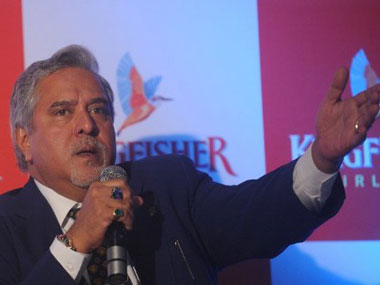Beleaguered Kingfisher Airlines Chairman Vijay Mallya removed his rattling bowl from public view on Tuesday. “We have not asked for any bailout from government. We have not asked the government to dip into the taxpayer’s money. We have never done it, we will never do it.”
He should get a silent thank you note from Finance Minister Pranab Mukherjee, whose exchequer isn’t overflowing with cash these days.
This doesn’t mean Mallya won’t pass the hat around. But, he says, all he wants now is some flexibility from banks with working capital arrangements. And a shoulder to cry on.
[caption id=“attachment_131715” align=“alignleft” width=“380” caption=“The real problem was Kingfisher pulled defeat from the jaws of victory when it bought bleeding Deccan. AFP”]  [/caption]
We saw plenty of sniffing and moping on Tuesday. Fuel costs are too high - over 50 percent of our costs, said Mallya.
At a news conference on Tuesday, he admitted that the cancellation of many Kingfisher flights last week was a public relations disaster. “Mistakes happen and there is always room for improvement,” he said, adding that the airline wanted to stop flying on loss-making routes and reconfigure his aircraft to include more seats.
But the truest line he spoke related to his closure of Kingfisher Red - the low-cost carrier that ruined him. He said there was no real cost difference between the two sets of operations. Firstpost has always held that to be true (Read here and here for more on this).
Impact Shorts
More ShortsIf all success comes from an acceptance of reality, Kingfisher has got there at last. The real problem was Kingfisher pulled defeat from the jaws of victory when it bought bleeding Deccan. It went for scale and size and hubris when it was already the best brand in full-service flying.
In trying to do a balancing act between running a full-service airline and a cut-rate carrier, it fell between two stools.
But having heard Mallya’s mea culpas, it’s time to hang a part of the blame around the government’s neck. There is no doubt the government has a flawed aviation policy that does nobody any good. Here’s why.
Problem one is a wayward policy regime. You can’t do much about fuel costs and airport charges, except regulate them. But you can do something about bringing in investors. Indian aviation’s biggest problem is not that it can’t get cheap fuel, but that it can’t get cheap money from foreign airlines to invest in domestic carriers. The foreign direct investment (FDI) limit is 49 percent, but (surprise) foreign airlines can’t invest in them. If airlines can’t invest in airlines, what’s the idea?
This rule was inserted after hectic lobbying by private airlines, and especially Jet, and possibly Air India, which were both afraid that the Tatas would enter the industry with Singapore Airlines. Now, a decade later, the same rule has come back to sting Jet and Kingfisher, both of whom are in need of huge FDIs to bail themselves out. A policy intended to benefit Jet will need modification to save Jet and the rest of the industry. Some discussions are already underway in government.
Problem two is Air India. As long as Air India is kept artificially afloat with periodic infusions of capital and loans, the aviation sector will always be a mess. When one player in the industry can use taxpayers’ money to stay afloat and keep fares low, the rest of the industry will have to compete on its terms. A weak Air India will keep the rest of the industry weak, too.
The only way out is to privatise Air India - and this is where FDI will help the entire sector become healthier. Air India could sell a 51 percent stake to a foreign airline for survival. The only question is whether anyone will bite. No one wants Godzilla as partner. It’s best to privatise it fully.
Problem three is infrastructure. Most Indian airports - barring Delhi and Mumbai - are in the public sector. They need investment and upgradation. But upgradation is going to push up costs for the airline business as landing, parking and other fees will need raising. These costs not only need to be contained, but there is a case for creating more airport capacity and competition even among airports. The likes of EasyJet and RyanAir offer low fares because they use less-used airports. This again calls for policy changes to attract FDI and competition.
The world over, the airline business is a mugs’ game with few people making any real money from it. Airports and airlines are capital-intensive businesses. They are not for the faint-hearted. Only those with deep pockets can remain in this business.
It is time to invite foreign airlines and airport companies to share the losses of the Jet, Air India and Kingfisher. There’s no national pride at stake in keeping all the red ink to ourselves.


)

)
)
)
)
)
)
)
)



